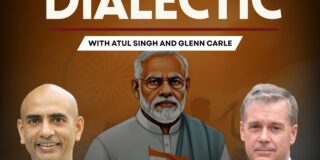Cryptocurrency is a virtual asset. Although it functions like currency, it is nothing more than a digital entity that can be transmitted from person to person electronically. Some cryptocurrencies are tokens that represent other assets, like US dollars, but Bitcoin, the most famous, is not a token of anything except itself.
For cryptocurrencies like Bitcoin, the data is not stored on any individual’s computer but is dispersed throughout a network. What the individual possesses is a passcode, and if the passcode is lost, the money becomes irretrievable. Some people have lost very large sums of money in this way. Furthermore, if a thief gains access to the passcode, they can easily steal the money. This happens very often.
Loss and theft are just one kind of risk for Bitcoin users. A still greater risk is volatility. A currency is meant to perform two functions: it is a store of value over time and a means of exchange between economic actors. Bitcoin is not a reliable store of value over time, because its value varies very rapidly and unpredictably from day to day and month to month. A sum of bitcoin may rapidly be worth much less than what one has purchased it for.
Neither is Bitcoin a very useful medium of exchange, because most retailers will not accept it. Because of its anonymity, Bitcoin is instead commonly used for illicit purchases, such as narcotics or banned pornography. So, its lack of acceptance and its volatility risk make Bitcoin a very poor currency.
Bitcoin’s volatility attracts speculators hoping to profit off of the wide swings in prices, but the volatility hasn’t stopped people from trying to use Bitcoin as a currency, either. This is especially true for those who live in countries where the official currency itself is not very stable. El Salvador’s unconventional and authoritarian young president Nayib Bukele has even made Bitcoin an official currency — a move which, in McDonald’s view, has been an unmitigated disaster. The digital currency is not accessible to most Salvadorans and has likely only served to enrich a small number of people.
How does cryptocurrency work?
The technology that makes Bitcoin and cryptocurrencies possible is a “blockchain,” which is a networked set of computers that each keep a record, or “ledger,” of transactions made on the network. The computers verify the authenticity of each other’s ledgers.
In order to do this, the computers need to play a sort of digital guessing game, or “proof of work,” to deliver the correct codes to each other and authenticate transactions. This operation takes a lot of processing power, but it prevents hackers from altering the ledger, as it would not be feasible for them to perform the proof of work themselves to alter all of the computers on the blockchain.
Such self-checking networks are useful in more applications than cryptocurrency alone. They could for example be used for banks to compare notes with each other and prevent fraud.
Poor regulation and fraud galore
When cryptocurrency was becoming popular over the last decade, the surge in public interest arose much more quickly than a response from regulators. This created a “wild west” environment in which fraudsters proliferated. One very common phenomenon was the creation of a new cryptocurrency, or “altcoin,” which would quickly attract attention and a lot of buyers. Many of these altcoins were backed by nothing except hope. Before long, the creators would pocket the money and have delivered nothing but a worthless asset in exchange.
To remedy this problem, “stablecoins” backed by official currencies proliferated. These too have a fair share of problems: unpredictable exchange fees, lack of transparency and insufficient currency reserves to serve as the backing for the coins. Thus, underneath the façade of stability, stablecoins are highly unreliable.
There really is no practical reason to use cryptocurrencies rather than banks to transfer money; they are less trustworthy, slower and often cost more to make transactions. Much of their dedicated following has an ideological rather than financial purpose; libertarians who crave anonymity and shun government currency are often fanatics for cryptocurrency. Many more have simply been attracted by the flurry of attention, creating a bubble which is unsupported by fundamentals and ready to burst. The cryptocurrency market has already lost over half of its peak value, tumbling from $3 trillion to $1.2 trillion.
McDonald predicts the continued erosion of the market. Cryptocurrency’s early advantages will disappear with time as its popularity deflates and ways are found to circumvent the privacy that the technology initially offered. What is more interesting for the future, however, are the ways in which blockchain technology may be made useful in other applications. Secure, shared records could be beneficial for a wide variety of tasks.
[Anton Schauble wrote the first draft of this piece.]
The views expressed in this article/podcast are the author’s own and do not necessarily reflect Fair Observer’s editorial policy.














Comment